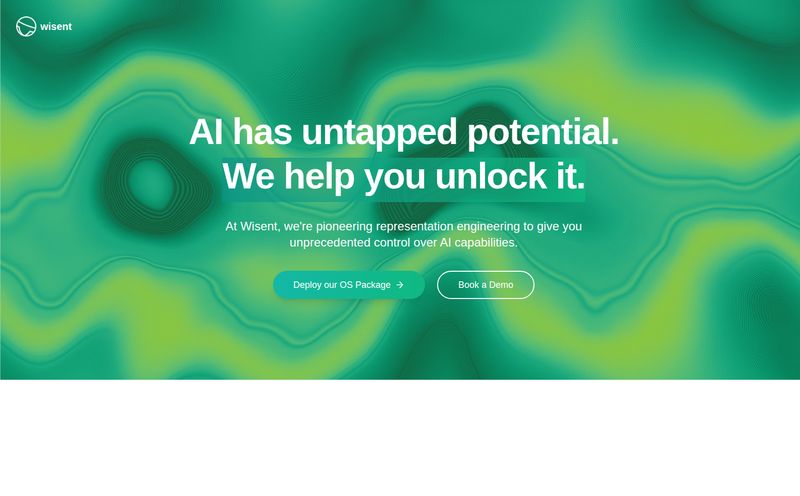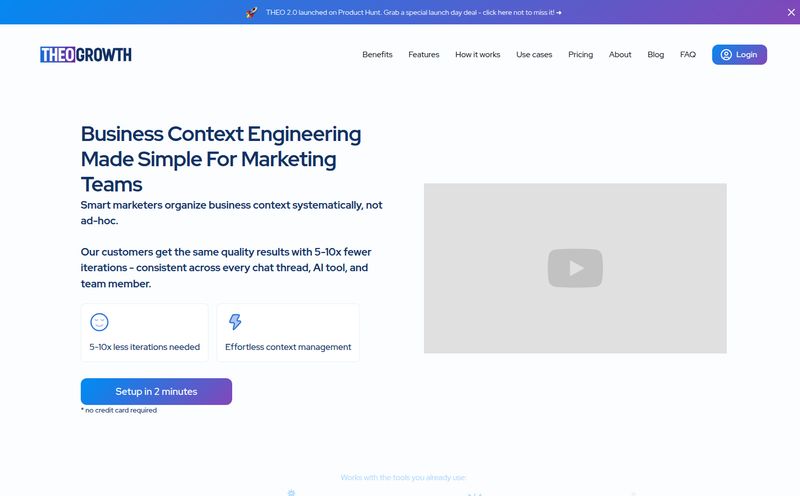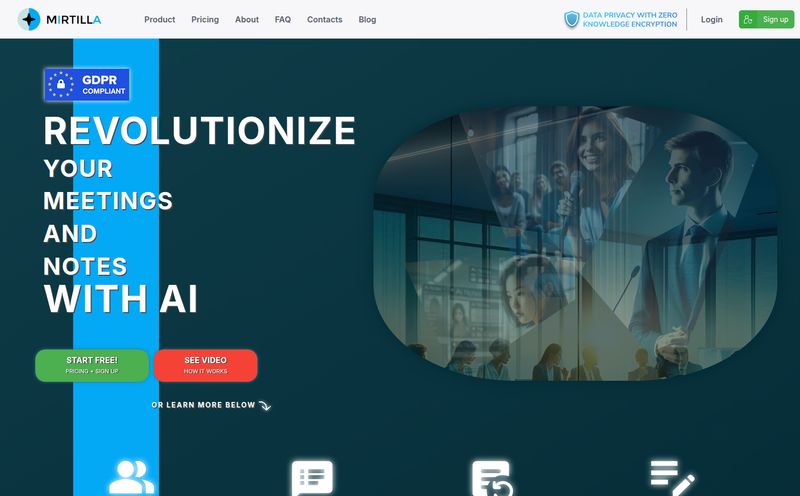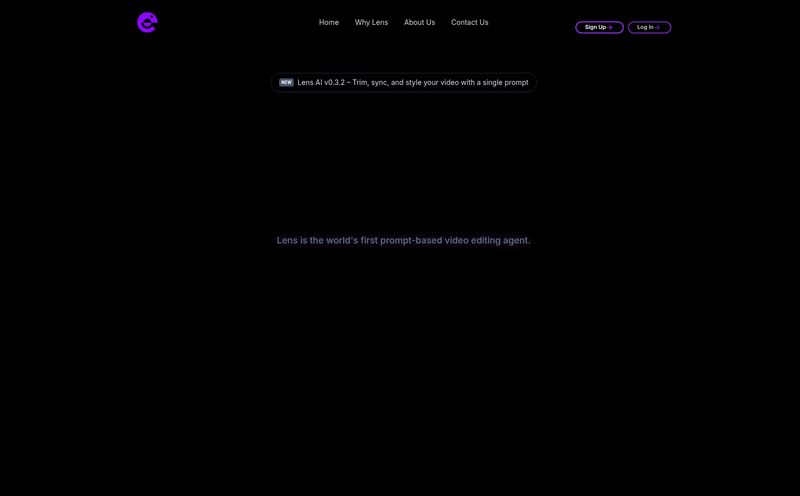I was grabbing coffee with a friend the other day—a family doc who's been in the trenches for over a decade. He looked… fried. Not just 'end of a long week' tired, but soul-level, existentially exhausted. The culprit? Not the complex cases, not the emotional toll, but the screen. The endless sea of checkboxes, the templates that never quite fit, the hours spent after his last patient just charting. He called it “death by a thousand clicks.”
Sound familiar? I bet it does. For years, we've talked about EMRs and the burnout epidemic. We got into medicine to connect with people, not to become high-paid data entry clerks. But what if the tech that got us into this mess could also get us out?
I’ve been watching the rise of AI in healthcare with a healthy dose of skepticism. We've seen a lot of hype and not a lot of practical, day-to-day solutions. But lately, a few tools have caught my eye, and one in particular, Apollo Health AI, seems to be getting a lot of things right.
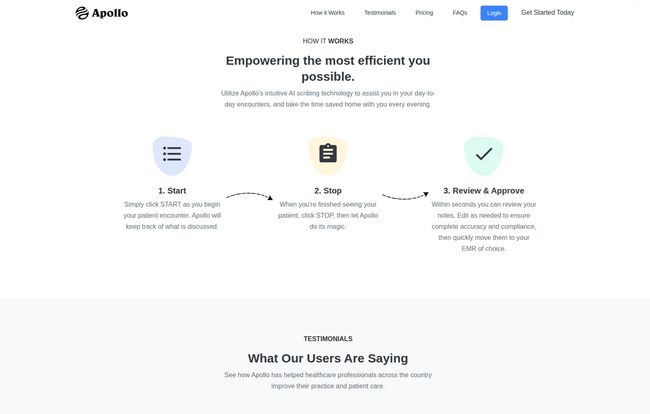
Visit Apollo Health AI
So What Exactly Is Apollo Health AI?
Let’s cut through the jargon. Apollo Health AI is an AI-powered medical scribe. Think of it as a hyper-efficient assistant that listens to your patient encounter and then, almost instantly, drafts your clinical notes for you. It’s a web-based application, meaning there’s no clunky software to download or install. You just log in and go.
The goal here isn't to replace your clinical judgment. Not at all. It's to handle the grunt work, the tedious transcription that steals your time and mental energy. It takes your spoken conversation and structures it into a coherent SOAP note, ready for your review and sign-off. The idea is simple but, if it works, pretty revolutionary for a clinician's workflow.
How This AI Scribe Actually Works
One of the things that impressed me immediately was the simplicity. There isn’t some arcane, 50-step process. They’ve boiled it down to a workflow that anyone can master in about 30 seconds. Seriously.
- Start: When you walk into the room with your patient, you just open the web app on your computer and click 'START'. That's it. Apollo starts listening and taking note of the conversation.
- Stop: Once the encounter is finished, you hit 'STOP'. The AI takes a few moments to process everything it heard. This is where the magic happens.
- Review & Approve: Within seconds, a fully drafted SOAP note appears on your screen. Now, this is the important part—you review it. You edit anything that needs tweaking, ensure accuracy, and make sure it reflects your professional assessment. Then, you simply copy and paste it into your EMR.
That’s the whole dance. It’s designed to be a background process, letting you focus on the person in front of you instead of the screen.
The Features That Actually Matter
A lot of software comes loaded with features you'll never touch. Apollo seems to have focused on the essentials, the things that make a tangible difference in a busy practice.
Automated SOAP Note Generation
This is the main event, of course. The ability to turn a natural conversation into a structured, well-organized clinical note is the core value. From what I’ve seen and heard from users like Dr. Gieseke (more on her later), the accuracy is surprisingly good. It’s not perfect—no AI is—but it provides a fantastic starting point that often requires minimal editing.
HIPAA Compliance is Non-Negotiable
Let's be real, if a tool in this space isn't HIPAA compliant, the conversation is over before it starts. Apollo Health AI makes it clear that they are, which is the absolute bare minimum for any tool handling Protected Health Information (PHI). For larger groups, they even offer an organization-wide Business Associate Agreement (BAA), which is a critical piece for legal and security peace of mind.
Simple EMR Integration
Okay, the term “integration” here is a bit generous. Apollo doesn't have a deep, API-level connection to Epic or Cerner. Instead, it relies on a universal solution: copy and paste. While some tech purists might scoff, I actually see this as a strength. It means it works with any EMR system, from the big hospital-wide platforms to the niche, specialty-specific ones, without needing a team of IT folks to set it up. It’s a pragmatic solution for a fragmented market.
Customizable Templates
One size never fits all in medicine. The testimonial on their site mentions the ability to switch templates on the fly. This flexibility is key. You can create and refine templates that match your specific style of note-taking or the requirements of your specialty, making the AI's output even more accurate and useful over time.
Let's Talk Money: Apollo Health AI Pricing
Pricing is often where these exciting new tools fall apart for the little guy. I was pleasantly surprised by Apollo's approach. It’s straightforward and seems genuinely designed to be accessible for solo practitioners and small clinics, not just massive hospital conglomerates.
| Plan | Price | Key Features |
|---|---|---|
| Free Trial | Free | 1-week free use, cancel anytime, no credit card needed. |
| Standard | $99 / month | Unlimited visits, cancel anytime. |
| Custom Group | Contact for Pricing | For larger practices, includes license management & organization-wide BAA. |
The free trial with no credit card required is a massive confidence signal. They're letting the product speak for itself. And at $99/month for unlimited use, you have to ask yourself: how much is an hour of your time worth? If this saves you even 2-3 hours of charting a month, it pays for itself many times over.
The Good, The Bad, and The Realistic
Why I Think It's a Game-Changer
The most obvious win is time. Giving clinicians back a few hours every week is huge. That’s more time for family, for hobbies, for just… decompressing. It’s a direct assault on the administrative burden that causes so much burnout. But I think the secondary benefit is even more powerful: it allows you to be truly present with your patients. Instead of splitting your attention between the person and the computer, you can maintain eye contact, listen actively, and build that all-important rapport. That's better for you and it's certainly better for patient care.
A Few Things to Keep In Mind
This isn't a magic wand. There are practical limitations to be aware of. First, you need a decent internet connection. It’s a web app, so no Wi-Fi means no AI scribe. Second, the accuracy is dependent on audio quality. A noisy room, soft-spoken patients, or heavy accents could trip it up, requiring more editing on your part. And probably the most important thing to remember is the 30-day deletion policy. Notes are automatically deleted after 30 days unless you've saved them. This is a security feature, but it means you need a solid workflow for reviewing and transferring notes to your EMR promptly. This isn't a long-term storage solution; it's a bridge.
A Word From a Real Doctor
Don't just take my word for it. I was struck by the testimonial on their site from Dr. Lisa Gieseke, MD. She said:
"Apollo has allowed me to focus on my patients and get out from behind my computer. I love that I can switch templates on the fly and if I accidentally chose the wrong one, I just select a new one and Apollo generates a new note! The developers are very open to feedback and are constantly working to make this the best product on the market for an affordable price."
That feels authentic. It touches on the core benefits—patient focus, flexibility—and hints at a responsive development team, which is always a good sign.
Is This the Right Tool for Your Practice?
So, who is this really for? In my opinion, Apollo Health AI is a perfect fit for solo practitioners, small to medium-sized clinics, and specialists who feel chained to their EMR. If you're nimble, comfortable with a 'copy and paste' workflow, and desperate to reclaim your time from administrative tasks, this could be a fantastic investment. For huge hospital systems with deeply entrenched, customized EMRs, the adoption might be more complex, but for the independent clinician, it looks incredibly promising.
Final Thoughts on Apollo Health AI
Look, the problem of documentation burnout isn't going away on its own. We can't wait for a top-down solution from EMR vendors or hospital administrators. Tools like Apollo Health AI represent a bottom-up revolution, giving individual clinicians the power to change their own workday. It's not about replacing doctors; it's about empowering them to do what they do best.
It’s simple, its affordable, and it tackles the single biggest pain point in modern medicine. If you’re feeling fried like my friend, what do you have to lose by trying it for a week? You might just get your evenings back.
Frequently Asked Questions
Is Apollo Health AI really HIPAA compliant?
Yes, they state they are fully HIPAA compliant. They employ necessary safeguards to protect patient data and offer a Business Associate Agreement (BAA) for practices, which is a key requirement for compliance.
Do I need to download any software?
Nope. Apollo Health AI is a web-based application, which means you can access it from any computer with an internet browser. There's no installation required.
What happens if my internet or computer crashes during an appointment?
This is a practical concern. Since it's web-based, a stable internet connection is necessary during the recording. If it crashes, you'd likely lose the recording for that session. It's always wise to have a low-tech backup plan in mind, just in case.
How long are my notes stored?
The notes are automatically deleted from Apollo's servers after 30 days. It's designed as a temporary processing tool, not a permanent medical record. You need to review, finalize, and move the note to your EMR within that timeframe.
Will this work with my specific EMR?
Yes, because it relies on a simple copy-and-paste function. It doesn't need a special integration, so it's universally compatible with any EMR system that allows you to type or paste text into a note field.
